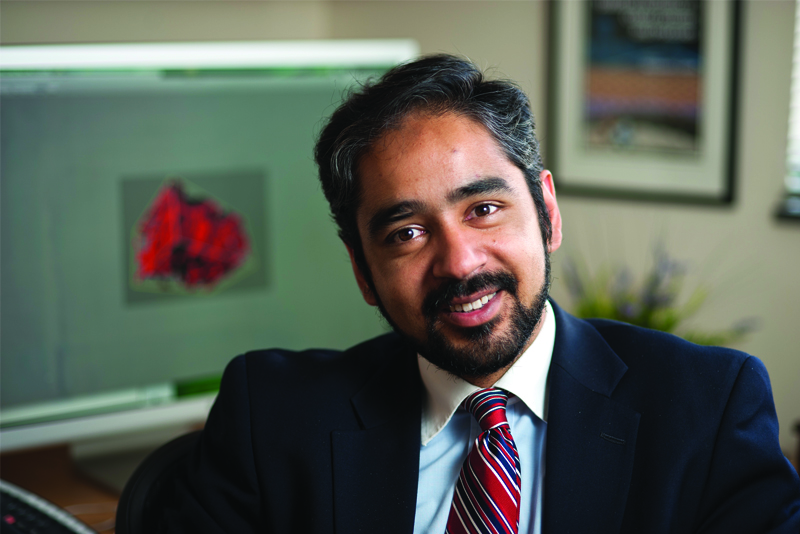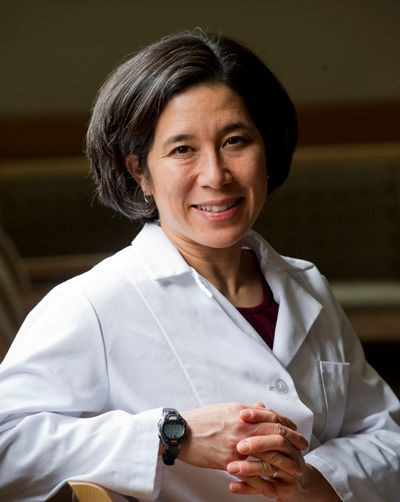Zaman, Morgan Honored
Elected as fellows to the American Institute for Medical and Biological Engineering (AIMBE) College of Fellows
The American Institute for Medical and Biological Engineering (AIMBE) has elected two Boston University College of Engineering faculty members—associate professors Muhammad Zaman (biomedical engineering, materials science and engineering) and Elise Morgan (mechanical engineering, biomedical engineering, materials science and engineering)—to the AIMBE College of Fellows. They join more than 1,500 outstanding biomedical engineers in academia, industry, and government around the world who have distinguished themselves through significant contributions in research, industrial practice, and/or education.
According to the AIMBE, election to the College of Fellows is reserved for the top two percent of the international medical and biological engineering community. The induction of Zaman and Morgan on March 16, 2015, at the AIMBE’s 2015 Annual Event at the National Academy of Sciences in Washington, DC, will bring the number of BU’s biomedical engineering faculty elected to this prestigious body to 30, placing the department among the top two or three biomedical engineering departments nationally.
AIMBE Fellows have helped to revolutionize medicine, engineering, and related fields that enhance and extend the lives of people all over the world. Boston University’s two newest members exemplify this tradition, having impacted society in myriad ways.
Associate Professor Muhammad Zaman

A College of Engineering faculty member since 2009, Zaman heads the Laboratory for Molecular & Cellular Dynamics, which engineers new experimental and computational technologies for major health care problems in both the developing and developed world, including probing the mechanisms of cancer metastasis. The lab focuses on how physical and mechanical properties of cancer cells impact their growth and movement, modeling this behavior in computer programs.
Meanwhile, Zaman is developing robust, cheap, portable, and user-friendly diagnostics and analysis toolkits to address global health challenges. As director of the Laboratory for Engineering Education and Development, he works with BU students to advance technologies to detect counterfeit drugs, preserve biological reagents used in diagnostic tests, and provide other in-demand health care solutions targeting the specific needs of resource-limited countries. He is also co-director of the Africa Biomedical Engineering Initiative, which was funded by UN Economic Commission for Africa to improve biomedical engineering education, innovation, and practice in Africa. In 2014, he was elected to the Board of Directors of the Consortium of Universities for Global Health, the most prestigious professional organization in the field
Zaman’s achievements in cancer and global health research have earned him funding from USAID, the Saving Lives at Birth Consortium, US Pharmacopeial Convention, the National Institutes of Health, the National Science Foundation, and many private foundations, as well as several invitations to participate in US National Academy of Engineering research and education symposia. The 2013 recipient of the Early Career Achievement Award from the IEEE Engineering in Medicine and Biology Society—the world’s largest international society of biomedical engineers—Zaman has served as keynote or plenary speaker at major national and international conferences and published dozens of highly cited papers in leading biomedical journals.
Associate Professor Elise Morgan

Since joining the College of Engineering faculty in 2003, Morgan has worked to advance understanding of the role of the mechanical function of tissues and organs in skeletal health, repair, and development, with the ultimate goal of pinpointing causes and treatments for osteoporosis, osteoarthritis, and poor bone healing.
As director of the Orthopaedic & Developmental Biomechanics Laboratory, Morgan studies the interplay among the mechanical behavior, structure, and biological function of tissues. Drawing on methods from engineering mechanics, materials science, and cell and molecular biology, and combining experimentation and computational modeling, Morgan’s lab investigates how mechanical factors contribute to the development, adaptation, failure, and regeneration of bone and cartilage. Current projects include the use of mechanical stimulation to promote bone regeneration, the biomechanics of spine fractures and bone healing, noninvasive diagnostics of bone healing, and inflammatory bone loss. This work has been funded by the National Institutes of Health, the National Science Foundation, private foundations, and industry sponsors.
Morgan has received a Ruth L. Kirschstein National Research Service Award for Senior Fellows from the National Institutes of Health, a Young Investigator Research Award from the International Osteoporosis Foundation and Servier Research Group, the 2013 Kappa Delta Young Investigator Award from the American Association of Orthopaedic Surgeons, and an Early Career Research Excellence Award and Distinguished Faculty Fellow Award from BU’s College of Engineering. She has published more than 50 peer-reviewed articles in major engineering journals and has delivered more than 40 seminars and invited talks. She is also the co-founder of a successful outreach program, Summer Pathways, which engages high school girls in a week-long sequence of activities in science, engineering, and math.
The mission of the AIMBE is to advance public understanding of medical and biological engineering, and honor significant achievements in the field. Representing university programs in medical and biological engineering, corporations, and professional societies engaged in advancing medical and biological engineering, the organization advocates for public policies that facilitate progress in medical and biological research, and for the development of products and services that benefit the public.